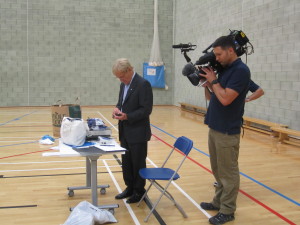We live in an obesigenic world.
That is one in which the availability of high fat foods, inappropriate portion sizes, sugary drinks, social customs that promote overeating, poor access to low calorie foods, lack of exercise and the relentless promotion of unhealthy food choices means it is far easier to get fat than to stay fit. One in which poor nutrition is actively encouraged as the food industry pours billions of dollars into researching, creating, advertising and marketing foods that encourage obesity.
The results of this relentless propaganda speak for themselves. Currently, more than a billion people worldwide are overweight and over 300 million obese.* In the US alone obesity rose from 13% to 32% between the 1980’s and 2007. Currently 68% of American adults are overweight. Experts warn that this is just the start. Unless individuals take positive steps to safeguard themselves the world’s population will continue to grow bigger and less healthy with every passing year. It is not just those in the richer, developed nations who are at risk. Obesity rates are rising equally rapidly among the growing middle classes in China, India, the Middle East and South America.
Having just finished filming two impulsive eating programmes for ITV, the problems caused by impulse snacking has been very much in my mind. To give one example. As a nation we get through an estimated 6 billion packets of crisps a year and on average we each consume 150 packets of savoury snacks over a twelve month period. By eating out of a packet or bag you can consume 20 – 30% more than if you were to dish out exactly what you wanted to eat.
What Can We Do To Break the Habit?
If you insert ‘pause points’ you’re less likely to eat mindlessly. A pause point is literally something that makes you stop for a minute – having to take the sweet out of a wrapper, or open a new packet.
One study took this phenomenon to the extreme and dyed every 7th Pringle in the tube bright red – just to make the participants stop and think. People given these tubes ate 48% less Pringles. That’s 250 calories in one sitting.
So if you snack impulsively keep in mind these simple rules.
You’re more likely to overeat if you don’t know when to stop – visual clues and pause points can be helpful reminders.
Large value packs might help your wallet but they won’t help your waist – you’ll end up eating more.
- Measure out snacks into little portions. Eat from a bowl not from the packet.
- If you take food to work don’t take the whole packet of biscuits. Take a few and put them in a smaller bag.
- Chose snacks that are individually wrapped. Just not being able to mindlessly put food in your mouth will give you a pause point and make you think about whether you really need that snack.
* Source: WHO; http://www.who.int/nutrition/topics/obesity/en/.

